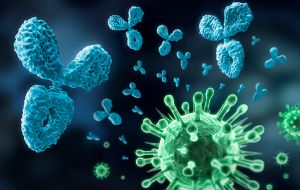MercoPress. South Atlantic News Agency
Bacteria antibiotic resistance is winning the day and a major threat to public health
 Dr Keiji Fukuda: in the post-antibiotic era, ”many common infections and minor injuries which have been treatable for decades can once again kill”
Dr Keiji Fukuda: in the post-antibiotic era, ”many common infections and minor injuries which have been treatable for decades can once again kill”  WHO report targets seven different bacteria responsible for diseases such as sepsis, diarrhea, pneumonia, urinary tract infections and gonorrhea
WHO report targets seven different bacteria responsible for diseases such as sepsis, diarrhea, pneumonia, urinary tract infections and gonorrhea A new report by WHO–its first to look at antimicrobial resistance, including antibiotic resistance, globally–reveals that this serious threat is no longer a prediction for the future, it is happening right now in every region of the world and has the potential to affect anyone, of any age, in any country.
Antibiotic resistance–when bacteria change so antibiotics no longer work in people who need them to treat infections–is now a major threat to public health.
“Without urgent, coordinated action by many stakeholders, the world is headed for a post-antibiotic era, in which common infections and minor injuries which have been treatable for decades can once again kill,” says Dr Keiji Fukuda, WHO’s Assistant Director-General for Health Security.
“Effective antibiotics have been one of the pillars allowing us to live longer, live healthier, and benefit from modern medicine. Unless we take significant actions to improve efforts to prevent infections and also change how we produce, prescribe and use antibiotics, the world will lose more and more of these global public health goods and the implications will be devastating.”
The report, “Antimicrobial resistance: global report on surveillance”, notes that resistance is occurring across many different infectious agents but the report focuses on antibiotic resistance in seven different bacteria responsible for common, serious diseases such as bloodstream infections (sepsis), diarrhea, pneumonia, urinary tract infections and gonorrhea. The results are cause for high concern, documenting resistance to antibiotics, especially “last resort” antibiotics, in all regions of the world.
Key findings from the report include:
• Resistance to the treatment of last resort for life-threatening infections caused by a common intestinal bacteria, Klebsiella pneumoniae–carbapenem antibiotics–has spread to all regions of the world. K. pneumoniae is a major cause of hospital-acquired infections such as pneumonia, bloodstream infections, infections in newborns and intensive-care unit patients. In some countries, because of resistance, carbapenem antibiotics would not work in more than half of people treated for K. pneumoniae infections.
• Resistance to one of the most widely used antibacterial medicines for the treatment of urinary tract infections caused by E. coli–fluoroquinolones–is very widespread. In the 1980s, when these drugs were first introduced, resistance was virtually zero. Today, there are countries in many parts of the world where this treatment is now ineffective in more than half of patients.
• Treatment failure to the last resort of treatment for gonorrhea–third generation cephalosporins–has been confirmed in Austria, Australia, Canada, France, Japan, Norway, Slovenia, South Africa, Sweden and the United Kingdom. More than 1 million people are infected with gonorrhea around the world every day.
• Antibiotic resistance causes people to be sick for longer and increases the risk of death. For example, people with MRSA (methicillin-resistant Staphylococcus aureus) are estimated to be 64% more likely to die than people with a non-resistant form of the infection. Resistance also increases the cost of health care with lengthier stays in hospital and more intensive care required.
Ways to fight antibiotic resistance
The report reveals that key tools to tackle antibiotic resistance–such as basic systems to track and monitor the problem–show gaps or do not exist in many countries. While some countries have taken important steps in addressing the problem, every country and individual needs to do more.
Other important actions include preventing infections from happening in the first place–through better hygiene, access to clean water, infection control in health-care facilities, and vaccination–to reduce the need for antibiotics. WHO is also calling attention to the need to develop new diagnostics, antibiotics and other tools to allow healthcare professionals to stay ahead of emerging resistance.
This report is kick-starting a global effort led by WHO to address drug resistance. This will involve the development of tools and standards and improved collaboration around the world to track drug resistance, measure its health and economic impacts, and design targeted solutions.




Top Comments
Disclaimer & comment rules-

-

Read all commentsHow much longer can humanity escape a Malthusian catastrophy ?? Forget bacteria for a while just think about virus and the end of the hidrocarbon global economy no more cheap fuel no more cheap food.
May 04th, 2014 - 02:12 pm 0http://www.youtube.com/watch?v=Z8lTMvtON5Q
There you go Toby might be right in 30 years time...
If antibiotic use were restricted, the selective pressure exerted by antibiotics for antibiotic resistance genes in bacteria would reduce, and those bacteria carrying plasmids with resistance genes would not flourish, and would tend to be outcompeted by their fellow non-resistant bacteria which have a lesser load to carry. It will always be a see-saw, but basic hygiene would be a good start.
May 05th, 2014 - 04:41 pm 0Commenting for this story is now closed.
If you have a Facebook account, become a fan and comment on our Facebook Page!